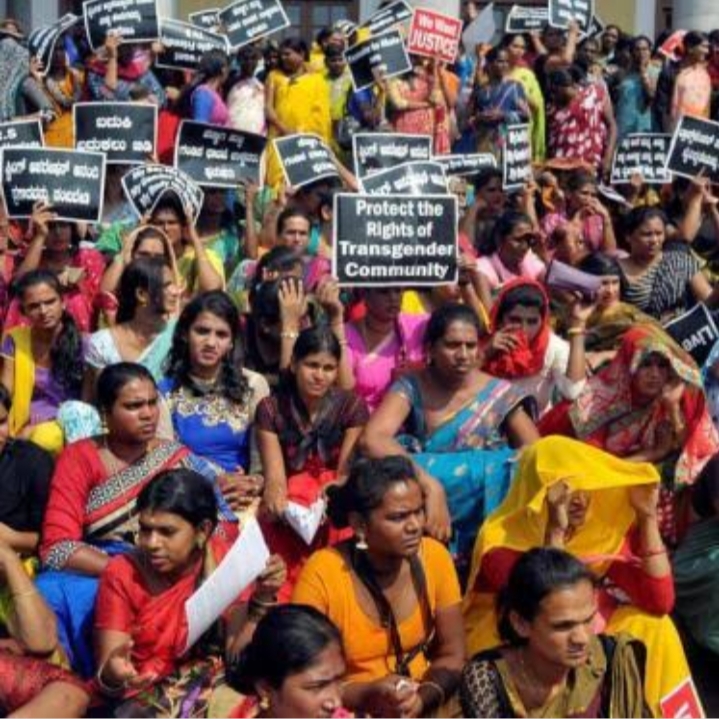INTRODUCTION
WHO ARE TRANSGENDER PERSONS?
A transgender person has a gender identity and gender expression that differed them from their assigned sex. The term ‘Hijra’ is the name of the business or the work identity provided to eunuchs, intersex people, and transgender people in South Asia. Transgender is an umbrella term given to people whose gender identity differs from the social construct. Transgender people are different from LGB – sexual inclination/ sexual orientation. So, a person can be a transgender and homosexual or transgender and heterosexual.
BACKGROUND OF THE BILL
- In 2013, An Expert Committee was set up by the government of India to study and understand the problems and challenges faced by transgender persons and find a solution to provide the remedies for the same.
- In 2014, In Landmark Judgement of National Legal Services Authority v. Union of India , the Hon’ble Bench of Supreme Court of India which includes CJI, delivered quasi-relief to the people from trans community by declaring transgender people to be a ‘third gender’. From this case, a new Gender was introduced in India officially.
The Judgment in National Legal Services Authority v. Union of India vindicates Transgender Person’s Right, and their gender identification, protected by the Constitution of India there are several Judgements which stands backed by the Supreme Court in the cases which include Justice K. S. Puttaswamy (Retd.) and Anr. v. Union of India and ors. (2017) and Navtej Singh Johar v. Union of India (2018). The judgment in National Legal Services Authority v. Union of India also highlighted the existence of transgender people from the Historical Background of India. It made reference to the HIJRA, KINNAR, AND JOGTA communities, spread across the country and beyond in the Indian subcontinent.
- Trans people were also guaranteed with their equitable fundamental rights, provided to every citizen of India under the Constitution.
- In 2014, A Bill named ‘The Rights of Transgendered Persons’ was introduced in the Rajya Sabha which encloses their Right to Life with Dignity and Legal Validation of 3rd Gender which open their ways for Public and private Jobs, Education Opportunities, protection in Health sector and protect them from Heinous Crimes.
- However, this Bill got lapsed and never originated in reality.
In 2016, A Standing-Committee was appointed by the Central Government which evaluates the validity and the grounds to work upon for the betterment of Transgenders in the New Bill of 2016.
The Standing Committee, made several recommendations including defining the term persons with intersex variations, granting reservations for socially and educationally backward classes, and recognition of civil rights including marriage, partnership, divorce and adoption.
However, this Bill also has gone into the cold box like the previous one due to Lok Sabha Collapse.
THE TRANSGENDER PERSONS (PROTECTION OF RIGHTS) BILL, 2019
Definition of a Transgender Person: The Bill defines a “Transgender Person” as An Individual whose gender does not match the gender assigned at birth, i.e. Male or Female. This term is very wide and covers various other varieties under one roof. It also includes trans-men and trans-women, gender-queers, and persons with socio-cultural identities, such as KINNAR and HIJRA.
Prohibition against Discrimination: the 2019 Bill also includes the separate portion to emancipate the type of Discrimination and neglection the people from these communities faced. It also provides with the Punishment to a person who is allegedly forcing a trans person into bonded labour or physical Discrimination of not allowing a trans person to cross a public area or common street or passage, manages to take control illegally of a trans person House or residential property, causing physical, sexual, verbal, economic and emotional abuse. He/ She can be imposed with 6 Month imprisonment, that can be extended up to two years.
The Bill completely abrogate any sort of Cruelty or Discrimination towards a transgender person on any of the legal grounds which violates their right to live freely and dignity.
Certificate of identity: The Bill, 2019 emancipates the right of Self- Perceived Gender Identity of a Trans person. As we know that transgender is a much wider term which shadows various other genders and Chronology within itself. Self- perceived gender means that those shadowed community people can freely share their name on their certificate, which declares their validity and presence in the community. It becomes easier for the governments also that what exact number of people requires shelter and welfare. Such certificate, according to the Bill, can only be issued by a District Magistrate. There is also a provision of Changing their Gender identification anytime by having generated a Revised Certificate from the DM’s office.
LACUNAS AND DISCRIMINATION IN THE ACT
- Definition of Transgender person is incomplete and needs more justification understanding of gender and sexual identity.
- The Bill lacks in differentiating between various Transgender Community and mention the irregular word ‘others’ for them rather than describing completely with their community’s names.
- The Bill Is a Consequence of The Directions of The Supreme Court of India in the National Legal Services Authority Vs Union Of India Case.
- The judgement directed in National Legal Services Authority Vs Union of India Case talks about the grant of various civil and fundamental rights to the transgender person. Hence, the legislation doesn’t provide reservation to other communities like LGBTQ+.
- If a District Magistrate refuses to issue a certificate to a transgender person, then there are no provisions and regulations mentioned in the Bill.
- The Bill doesn’t address the issue of non-consensual sex reassignment surgery.
- The Bill passed does not define clearly what constitutes Discrimination, and it’s certainty and nature to Propound that it is Discrimination against the transgender community. Hence, a certain limitation must be required in the legislation.
- The Madras High Court in Arunkumar v. The Inspector-General of Registration, 2019 highlight the agenda of the validity of consent given on behalf of intersex infants for undergoing sex-selective surgeries. It was held in the case that the consent of the parent could not be considered as the consent of the child. Hence, such surgeries should be prohibited. Therefore, this iconic judgment, which recognizes the consent rights of intersex children and the right to bodily integrity, must be emulated throughout the country.
- Also, there should be strict penalties to cure non-consensual sex reassignment surgery in transgender people. The doctors who are engaged in this illegal activity must also be punished.
- To create an aesthetic approach, the Narration of the term ‘Transgender rights’ should either be replaced by “Gender identity” or “gender expression”.
- The National Council for Transgender Persons (NCTP) which plays a vital role in the activation of the law, must be provided with greater representations from the community.
- The government should incorporate healthcare interventions into the Act for Transgender and intersex persons.
CONSTITUTIONALITY AND UNCONSTITUTIONALITY OF THIS ACT
ARTICLE 14 OF CONSTITUTION OF INDIA allows Discrimination based on reasonableness. Discrimination held in certain cases is known famously as Positive Discrimination.
ARTICLE 15(4) OF CONSTITUTION OF INDIA talks about the equality of the citizens of India based on social and education grounds for the development of the Backward classes.
SECTION 16 OF HINDU MARRIAGE ACT,1955 Consolidates the Rights of Children who are dismayed by their families after knowing the fact that they are going to be transgender. This section discusses the Legitimacy of children of void and voidable marriages. Also, this section gives social as well as educational benefits to the children whose both parents are Transgender or from LGB background. Previously, these LGB couples were unable to provide valuable and quality education to their adopted children, who also live their life under social dilemma because of their parent’s gender.
Section 16 states that –
(1) Notwithstanding that marriage is null and void under section 11, any child of such marriage who would have been legitimate if the marriage had been valid, shall be legitimate, whether such child is born before or after the commencement of the Marriage Laws (Amendment) Act, 1976 (68 of 1976), and whether or not a decree of nullity is granted in respect of that marriage under this Act and whether or not the marriage is held to be void otherwise than on a petition under this Act.
(2) Where a decree of nullity is granted in respect of a voidable marriage under section 12, any child is begotten or conceived before the decree is made, who would have been the legitimate child of the parties to the marriage if at the date of the decree it had been dissolved instead Of being annulled, shall be deemed to be their legitimate child notwithstanding the decree of nullity.
SOME SUCCESS STORIES OF TRANSGENDER PEOPLE
- INDIA’S FIRST TRANSGENDER LAWYER: Sathyasri Sharmila
- INDIA’S FIRST TRANSGENDER JUDGE: Joyita Mondal
- INDIA’S FIRST TRANSGENDER POLICE OFFICER: Prithika Yashin
- INDIA’S FIRST TRANSGENDER COLLEGE PRINCIPAL: Manabi Bandopadhyay
- INDIA’S FIRST TRANSGENDER PERSON TO CONTEST ELECTIONS: Mumtaz
CONCLUSION
- They should be treated equally, respectfully and with dignity without any discrimination.
- Not to be discriminated in exercising their right to apply for jobs, right to education, access to a public place.
- Shelter homes should also be made available for such transgenders who are facing violence and homeless.
- Creating the third gender officially as a new gender.
- Punishment of the crime to be increased from 2 years to 7 years or more if done against a transgender person.
- Awareness among people must be created to school children as well as their parents to protect those citizens from mental pressure. And to stop them from becoming a part of the joke.
CITATIONS
- Arun Kumar v. The Inspector-General of Registration, 2019 W.P. (MD) NO. 4125
- National Legal Services Authority v. Union of India sOF 2019 AND W.M.P. (MD) NO. 3220 OF 2019
- Justice K. S. Puttaswamy (Retd.) and Anr. v. Union of India and ors. (2017)
- Navtej Singh Johar v. Union of India (2018) WP 76/2016; WP (C) 572/2016
REFERENCES
Simran Sharma
Fairfield Institute of Management And Technology, Delhi
Via LAW MENTOR


